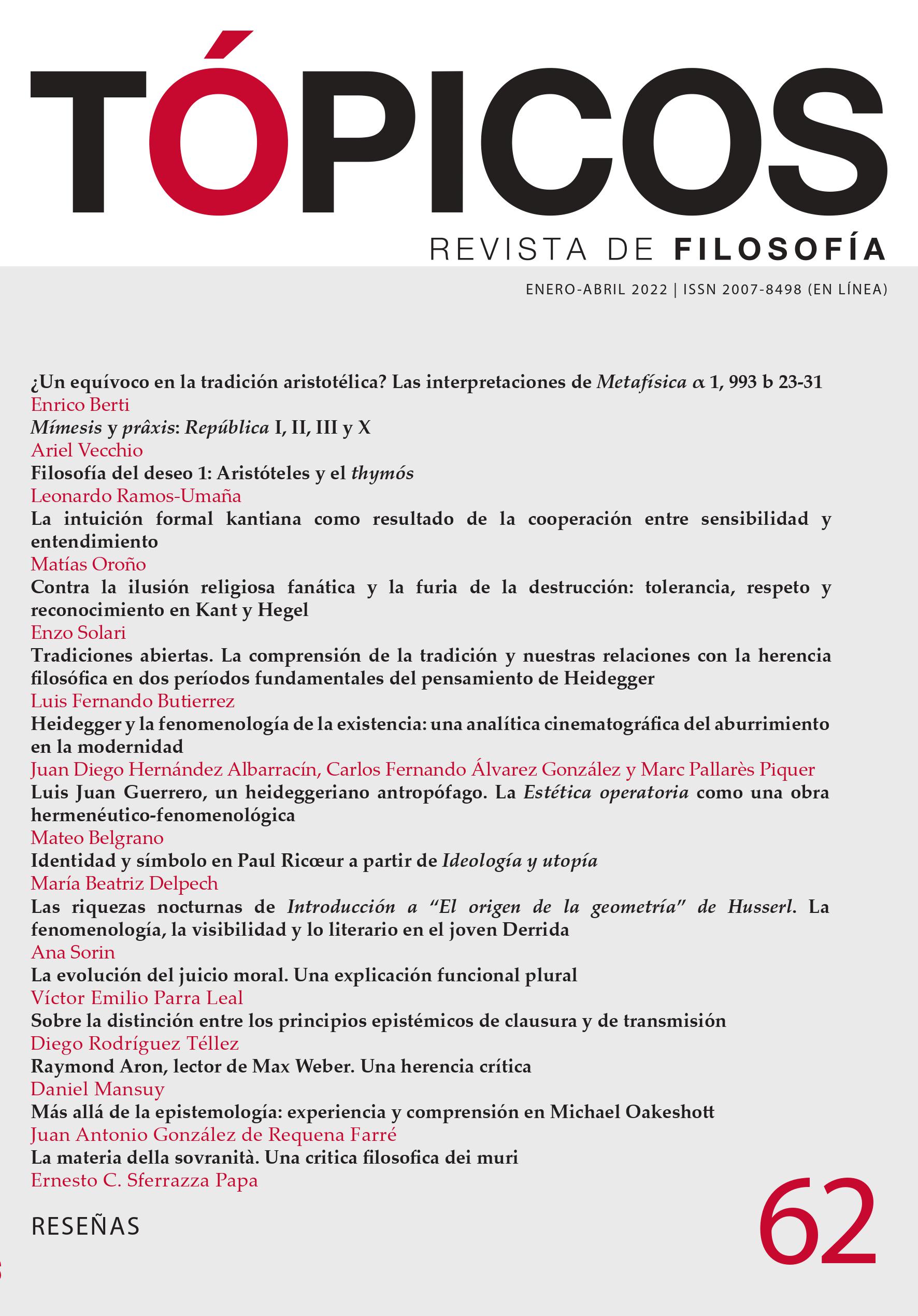Publicado 2021-12-11
Palabras clave
- principio de clausura,
- principio de transmisión,
- deducción competente,
- prueba de Moore,
- conocimiento
Derechos de autor 2021 Tópicos, Revista de Filosofía

Esta obra está bajo una licencia internacional Creative Commons Atribución-NoComercial-SinDerivadas 4.0.
Cómo citar
Resumen
Epistemólogos involucrados en algunos debates contemporáneos aceptan la distinción entre los principios epistémicos de clausura y de transmisión. Una discusión en la que esto sucede es la que se da en torno al diagnóstico adecuado de razonamientos como el involucrado en los casos de las cebras de Dretske. El objetivo de este texto es ofrecer razones para cuestionar la distinción entre ambos principios. Primero, introduzco la distinción entre los principios. Segundo, expongo las motivaciones más fuertes detrás de los principios; en particular, establezco que la motivación central detrás de clausura consiste en explicar el fenómeno de ampliación del conocimiento mediante la deducción. Tercero, basado en la identificación de una restricción sobre cualquier formulación apropiada de clausura capaz de explicar el fenómeno mencionado, cuestiono la aceptación de la distinción entre este principio y el de transmisión. Finamente, concluyo que cualquier formulación del principio epistémico de clausura que satisfaga la motivación central tras el principio lo colapsa con el principio epistémico de transmisión.
Referencias
- Baumann, P. (2011). Epistemic Closure. En S. Bernecker y D. Pritchard (eds.), The Routledge Companion to Epistemology. (pp. 597-608). Routledge.
- Blome-Tillmann, M. (2006). A Closer Look at Closure Scepticism. Proceedings of the Aristotelian Society, 106, 383-392.
- Broome, J. (2013). Rationality Through Reasoning. Blackwell.
- Brown, J. (2003). The Reductio Argument and Transmission of Warrant. En S. Nuccetelli (ed.), New Essays on Semantic Externalism and Self-Knowledge. (pp. 117-130). MIT Press.
- Carroll, L. ([1895] 1995). What the Tortoise Said to Achilles. Mind, 104(416), 691-693.
- Cohen, S. (1998). Two Kinds of Skeptical Argument. Philosophy and Phenomenological Research, 58(1), 143-159.
- Coliva, A. (2012). Mind, Meaning, and Knowledge. Themes from the Philosophy of Crispin Wright. Oxford University Press.
- Collins, J. (2014). Epistemic Closure Principles. En J. Fieser y B. Dowden (eds.), The Internet Encyclopedia of Philosophy. URL: http://www.iep.utm.edu/epis-clo/.
- David, M. y Warfield, T. (2008). Knowledge-Closure and Skepticism. En Q. Smith (ed.), Epistemology: New Essays. (pp. 137-186). Oxford
- University Press.
- Davies, M. (2003). The Problem of Armchair Knowledge. En S. Nuccetelli (ed.), New Essays on Semantic Externalism and Self-Knowledge. (pp. 23-55). MIT Press.
- Dretske, F. (1970). Epistemic Operators. Journal of Philosophy, 67, 1007-1023.
- Dretske, F. (2005). The Case Against Closure. En M. Steup y E. Sosa (eds.), Contemporary Debates in Epistemology. (pp. 13-26). Blackwell.
- Fernández, M. Á. (2011). Wright on the Cognitive Role of Entitlements. APA Newsletters, 10(2), 21-29.
- Hale, B. (2000). Transmission and Closure. Philosophical Issues, 10, 172-190.
- Harman, G. (1986). Change in View. MIT Press.
- Hawthorne, J. (2005). The Case for Closure. En M. Steup y E. Sosa (eds.), Contemporary Debates in Epistemology. (pp. 26-43). Blackwell.
- Kallestrup, J. (2012). Bootstrap and Rollback: Generalizing Epistemic Circularity. Synthese, 189, 395-413.
- Lehrer, K. (1999). Rationality. En J. Greco y E. Sosa (eds.), The Blackwell Guide to Epistemology. (pp. 206-219). Blackwell.
- Moore, G. E. (1959). Philosophical Papers. George Allen & Unwin.
- Moretti, L. y Piazza, T. (2013a). Transmission of Justification and Warrant. En E. Zalta (ed.), The Stanford Encyclopedia of Philosophy. URL: http://plato.stanford.edu/archives/win2013/entries/transmission-justification-warrant/.
- Moretti, L. y Piazza, T. (2013b). Transmission of Propositional Justification versus Transmission of Doxastic Justification. En E. Zalta (ed.), The Stanford Encyclopedia of Philosophy. URL: http://plato.stanford.edu/entries/transmission-justification-warrant/propositional-doxastic.html.
- Nozick, R. (1981). Philosophical Explanations. Harvard University Press.
- Pryor, J. (2000). The Skeptic and the Dogmatist. Noûs, 34(4), 517-549.
- Pryor, J. (2012). When Warrant Transmits. En A. Coliva (ed.), Mind, Meaning, and Knowledge. Themes from the Philosophy of Crispin Wright. (pp. 269-303). Oxford University Press.
- Schechter, J. (2013). Rational Self-Doubt and the Failure of Closure. Philosophical Studies, 163, 429-452.
- Sharon, A. y Spectre, L. (2013). Epistemic Closure Under Deductive Inference: What Is It and Can We Afford It? Synthese, 190(14), 2731-2748.
- Silins, N. (2005). Transmission Failure Failure. Philosophical Studies, 126, 71-102.
- Tucker, C. (2010a). Transmission and Transmission Failure in Epistemology. En J. Fieser y B. Dowden (eds.), The Internet
- Encyclopedia of Philosophy. URL: http://www.iep.utm.edu/transmis/.
- Tucker, C. (2010b). When Transmission Fails. Philosophical Review, 119(4), 497-529.
- Turri, J. (2010). On the Relationship Between Propositional and Doxastic Justification. Philosophy and Phenomenological Research, 80(2), 312-326.
- Williamson, T. (2000). Knowledge and Its Limits. Oxford University Press.
- Wright, C. (1985). Facts and Certainty. Proceedings of the British Academy, 71, 429-472.
- Wright, C. (2002). (Anti-)Sceptics Simple and Subtle: G. E. Moore and John McDowell. Philosophy and Phenomenological Research, 65(2), 330-348.
- Wright, C. (2003). Some Reflections on the Acquisition of Warrant by Inference. En En S. Nuccetelli (ed.), New Essays on Semantic Externalism and Self-Knowledge. (pp. 57-77). MIT Press.
- Wright, C. (2004). Warrant for Nothing (and Foundations for Free)? Proceedings
- of the Aristotelian Society, 78 (volumen suplementario), 167-212.
- Wright, C. (2012). Replies Part IV: Warrant Transmission and Entitlement. En A. Coliva (ed.), Mind, Meaning, and Knowledge. Themes from the Philosophy of Crispin Wright. (pp. 451-586). Oxford University Press.
- Wright, C. (2014). On Epistemic Entitlement (II). En D. Dodd y E. Zardini (eds.), Scepticism and Perceptual Justification. (pp. 213-247). Oxford University Press.
- Zalabardo, J. (2012). Wright on Moore. En A. Coliva (ed.), Mind, Meaning, and Knowledge. Themes from the Philosophy of Crispin Wright. (pp. 304-321). Oxford University Press.





